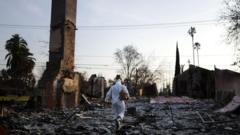With the substantial impact of recent fires leading to significant losses in the Los Angeles music community, the Grammy Awards are poised to transform into a more reflective and charitable event. While concerns of perceived insensitivity linger, the ceremony aims to honor victims and utilize its platform for support and healing.
LA Fires Reshape This Year's Grammy Awards: Challenges and Charitable Focus

LA Fires Reshape This Year's Grammy Awards: Challenges and Charitable Focus
In the wake of the devastating fires that ravaged Los Angeles, the Grammy Awards will take on a new tone this year, emphasizing resilience and fundraising over glitz and glamour.
The week leading up to the Grammy Awards is usually filled with glamour, exclusive parties, and excitement in Los Angeles, the heart of the music industry. However, this year's atmosphere has been drastically altered due to the most horrific fire disaster in the region's history, which left a trail of destruction and devastation. The fires were only extinguished after 24 days, costing the lives of 29 individuals and destroying over 16,000 homes and businesses, including those belonging to numerous artists and music professionals.
Despite initial doubts about whether the Grammy ceremony would proceed as planned this Sunday, the Recording Academy has decided to honor the event as a symbol of unity and resilience. Harvey Mason Jr., CEO of the Recording Academy, emphasized the importance of the event, mentioning consultations with public officials who encouraged moving forward. The ceremony will have a reimagined format, replacing the usual excitement with a more somber tone that acknowledges the tragedy while celebrating music’s vital role in healing and support.
While intentions lean toward honoring victims and showing solidarity with Los Angeles, critiques have emerged, questioning the appropriateness of hosting festivities amid widespread suffering. Critics like creative director Elyn Kazarian expressed discomfort with the idea of celebrities dressed in designer attire on the red carpet while many community members are coping with loss and destruction.
As part of the restructured format, fire relief efforts will be highlighted throughout the event and the city will take center stage. Show producers aim to raise funds to support recovery initiatives, with many artists lending their voices and performances to the cause.
The Grammy ceremony is not without precedent in dealing with significant events. Past challenges, such as the COVID-19 pandemic, forced adaptations, but this year's situation is unique in nature and urgency. Experts note that while the wildfire tragedy is less widespread than a pandemic, it has led to immediate impacts on industry professionals, many of whom have lost critical equipment and personal possessions.
In a parallel move, other events leading up to the Grammys have canceled their celebrations, with companies like Spotify opting to redirect funds instead. Gathering to celebrate music during a time of grief poses significant questions about what kind of message the industry wishes to convey.
As the Grammys prepare to take a different path, so too does the music community in Los Angeles. The fire disaster has illuminated the strength and resilience of artists and industry workers, emphasizing hope and communal support for the future. The world will watch as this year's Grammy Awards strive to balance celebration with reverence, making a compelling case for the healing capabilities of music in times of crisis.
Despite initial doubts about whether the Grammy ceremony would proceed as planned this Sunday, the Recording Academy has decided to honor the event as a symbol of unity and resilience. Harvey Mason Jr., CEO of the Recording Academy, emphasized the importance of the event, mentioning consultations with public officials who encouraged moving forward. The ceremony will have a reimagined format, replacing the usual excitement with a more somber tone that acknowledges the tragedy while celebrating music’s vital role in healing and support.
While intentions lean toward honoring victims and showing solidarity with Los Angeles, critiques have emerged, questioning the appropriateness of hosting festivities amid widespread suffering. Critics like creative director Elyn Kazarian expressed discomfort with the idea of celebrities dressed in designer attire on the red carpet while many community members are coping with loss and destruction.
As part of the restructured format, fire relief efforts will be highlighted throughout the event and the city will take center stage. Show producers aim to raise funds to support recovery initiatives, with many artists lending their voices and performances to the cause.
The Grammy ceremony is not without precedent in dealing with significant events. Past challenges, such as the COVID-19 pandemic, forced adaptations, but this year's situation is unique in nature and urgency. Experts note that while the wildfire tragedy is less widespread than a pandemic, it has led to immediate impacts on industry professionals, many of whom have lost critical equipment and personal possessions.
In a parallel move, other events leading up to the Grammys have canceled their celebrations, with companies like Spotify opting to redirect funds instead. Gathering to celebrate music during a time of grief poses significant questions about what kind of message the industry wishes to convey.
As the Grammys prepare to take a different path, so too does the music community in Los Angeles. The fire disaster has illuminated the strength and resilience of artists and industry workers, emphasizing hope and communal support for the future. The world will watch as this year's Grammy Awards strive to balance celebration with reverence, making a compelling case for the healing capabilities of music in times of crisis.




















